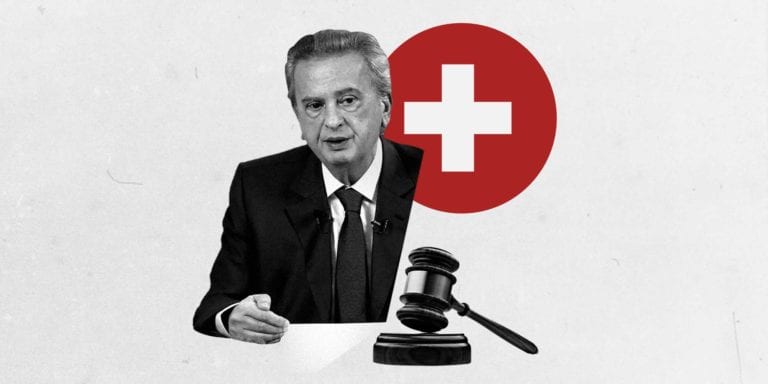Last week, the Office of the Attorney General of Switzerland (OAGS) sent Lebanon a request for judicial assistance concerning aggravated money laundering. An amount $400 million reportedly made it from Lebanon to Switzerland in an improper manner.
A year ago, the situation was reversed. At that time, Lebanon submitted a request for mutual legal assistance to Switzerland. Despite the capital controls imposed by Lebanese banks, more than $2.3 billion allegedly found its way into Swiss accounts.
The request for judicial assistance failed to produce any significant results. According to the Swiss Federal Office of Justice (FOJ), the request did not contain enough information to start an investigation. According to FOJ, it informed the Lebanese, yet is still waiting for a response.
Four Conditions to Freeze Accounts
After the request had failed, Swiss MP Fabian Molina raised the issue in parliament. On March 4, 2020, he asked the 7-member Federal Council (FC), the Swiss federal government, 14 questions, among which: “Did the Federal Council, Financial Market Supervisory Authority (FINMA) or OAGS initiate an investigation?”
Two months later, he received a rather unsatisfactory reply. While the FC cannot give any information about the procedures of other agencies, it wrote, the situation in Lebanon had been carefully examined. Referring to the Swiss Law on Potentates (LOP), it had been decided not to freeze any accounts.


The LOP allows the FC to freeze all assets of a foreign politically exposed person (PEP) if the following points are met:
1. Loss of power of the government in the country of origin.
2. Notoriously high corruption in the country of origin.
3. Assets were probably acquired through crime, such as corruption.
4. The protection of Swiss interests requires a freeze.
In its reply to Molina, the FC merely said the four points were not cumulatively fulfilled.
“That’s a rather stupid answer,” Molina told Daraj. “That was clear to me. Otherwise they would have already blocked the funds. I found out with people in the administration that, according to the FC’s interpretation, the fourth criterion was not fulfilled: Swiss interests.”
“According to the interpretation of the Federal Council the fourth criterion is not met.”
Fabian Molina, Member of Parliament
According to Molina, this is very political condition, which can only be met if a solid case can be made that Switzerland’s reputation could be seriously damaged.
In 2002, such a reputational disaster almost happened. When, 16 years after Jean-Claude “Baby Doc” Duvalier’s fall in Haiti, no verdict had been reached on what to do with his blocked funds. The $6.7 million almost went back to the Duvalier clan. At that time, however, the FC blocked return of funds by emergency law.
Journalist Balz Bruppacher, an author and expert on money laundering in Switzerland, added that the cumulative fulfillment of the four criteria is in the interest of the financial sector, which is economically extremely important to the country. Ten years ago, when Switzerland blocked accounts from Tunisia, Egypt and Libya in response to the Arab Spring, Swiss banks were afraid that clients from the MENA region would close their accounts, because they might lose confidence in the Swiss financial sector.
According to Bruppacher, it is this fear that led to the rather flexible paragraph about “Swiss interests,” so that the FC can protect the banking sector. Monika Roth, a professor specialized in financial markets and banking law, as well as a specialist in compliance, said the POL in the case of Lebanon did not apply at all. Legally speaking, Lebanon still has a government.
“I doubt that this law offers any leverage in the Lebanese case.”
Balz Bruppacher, money laundering specialist
But if the FC did not freeze the accounts in accordance with the POL, while the Lebanese request of January 2020 was not processed any further, how did the Salameh accounts come to be frozen? The OAGS press release provides a clue: money laundering.
Hurdle Race in Case of Money Laundering Suspicion
In Switzerland a money laundering investigation usually starts with the banks. According to the Swiss Anti-Money Laundering Act, which was tightened in 2008, they are the first instance to track down black money. If they suspect money laundering or a preparatory crime, such as corruption or extortion in a client relationship or transaction, they must report it.
The sanctions for failing to do so are relatively low. According to the Swiss penal code, the maximum fine is 500,000 Swiss francs, while in case of negligence it’s 150,000 francs. By comparison, the 2019 profit of UBS, Switzerland’s largest bank in terms of balance sheet, was 4.3 billion francs.
When a report is filed about a suspicious transaction, it goes to the Money Laundering Reporting Office Switzerland (MROS) a subdivision of the Federal Police. It filters the information, checks the background and forwards relevant cases to the OAGS, which opens an investigation.
However, in 2018, the MROS only employed around 30 staff to process 6,126 reports. The following year, as the MROS annual report shows, the number of reports to deal with was even higher (7700). Checking each report is a lot of work, and a lot of it is left undone. In the past two years, a little more than half the reports could be processed, while old reports from previous years were still piling up. For example, at the end of the 2019, there were still 10 unprocessed reports from 2016 on the desks. When asked, the MROS describes these circumstances as “a challenge.”
When asked whether MROS is satisfied with the basic mechanism of self-regulation, it answers somewhat laconically: “the MROS fulfils its tasks with the political instruments at its disposal.”
Silver lining: 12 new full-time positions were created in 2020, and reports can now also be submitted digitally. This eliminates the need for manual input and the MROS hopes that this will increase efficiency.
When Did Today’s Investigation Start?
The process described above is supervised by the Financial Market Supervisory Authority (FINMA). According to MPMolina, FINMA knew nothing about Lebanese funds in Switzerland until early summer. It must have become aware of the funds later, as in the Tagesanzeiger of August 29, FINMA said it was in contact with all relevant banks and national and international authorities. When exactly, it seemingly does not want to disclose.
According to the same newspaper article, the OAGS was not yet conducting any proceedings regarding Lebanese funds. So, the earliest the authorities could have started investigations and blocked Salameh’s accounts was last September.
Bruppacher assumes that a suspicious activity report involving a foreign head of a central bank is prioritised. If there is something to it, the report should at least reach the OAGS within a few weeks. The latter then needs some time to open proceedings, but here too such a prominent case should be dealt with swiftly. So, given the Swiss request for mutual legal assistance arrived in Beirut in mid-January, the latest the report could have been filed is mid-December – if the Swiss authorities work quickly, and over the holidays.
If a suspicious activity report via MROS triggered the investigation, we are looking at a period of about four months: from mid-August, to mid-December. Bruppacher, Molina and MROS agree that it is often a media report that leads to a SAR, triggered by a background check by a bank’s compliance department.
Google Trends records interest in search terms in terms of time and geography. It appears that the keyword “Riad Salamé” in Switzerland in the second half of 2020 can be mapped. Three peaks show when he was googled in Switzerland: after the Beirut Port explosion in the beginning of August, at the end of August when the Lebanese Central Bank (BDL) announced it would soon no longer be able to subsidise goods, and at the end of November, when the BDL was checking whether the guaranteed reserves can be tapped.
The Most Likely Way
It is not possible to determine through which route exactly the Salamé investigation was initiated. But the probability that it was via Lebanon’s first request for legal assistance is relatively low. It is also unlikely that Molina’s advance via the POL led to the accounts being frozen.
The most unspectacular way is the most likely. Due to a media report on the Beirut port explosion or a BDL tactic, the alarm bells started ringing at a Swiss bank, which did its duty and filed a report at the MROS, which did a background check and passed its suspicions onto the OAGS, which started an investigation and in the process submitted a request for legal assistance to Lebanon – a process completely independent of the first request.
Complex Criminal Proceedings
Monika Roth estimated the status of the proceedings to be a preliminary investigation. The authorities simply cannot have gotten much further in such a short period of time.
“If Salameh really wants to cooperate, he should offer to travel to Switzerland – with assurance of free passage.”
Monika Roth, criminal lawyer
“The Office of the Attorney General will now wait for information,” said Roth. “After that, it’s a matter of questioning Salameh. If he really wants to cooperate, he should offer the authorities to travel to Switzerland – under safe conduct.”
The OAGS will then, after a successful interrogation, look for evidence. It will analyze the money flows, check where the money came from, trace the bank transactions. It is a slow and laborious process that will take several years, Roth said.
“The question automatically arises as to where he got so much money. That is already an urgent suspicion of a crime.”
Monika Roth, criminal lawyer
If the OAGS comes across an urgent suspicion of a crime, it must file charges (“in dubio pro duriore”). The charge can only be dropped if there is a clear lack of misconduct – which will arguably not be the case with Salameh.
“I don’t assume that Mr. Salameh earns 20 million a year,” Roth said. “If we are talking about several hundred million, the question automatically arises as to where he got so much money. That is already an urgent suspicion of a crime.”
The jurisdiction of the courts in case of money laundering via Swiss banks automatically lies in Switzerland. This means that Salameh can be convicted in the Swiss Federal Court if he has committed a crime. If there is such a final conviction, the funds will be officially confiscated and handed over to the injured parties. Who that will be is hard to tell at the present state.
If Salameh is convicted in Switzerland, he can also be punished in Switzerland. For aggravated money laundering, the maximum penalty is 5 years in prison with a fine of 500 daily rates. Lebanon does not have an extradition treaty with Switzerland. In order for Salameh to be held accountable in the event of a final conviction, he must either be extradited or tried in Lebanon.
Overall, the process of prosecution can still take a very long time. In addition to the years of the OAGS investigating, a verdict must be handed down.
“The Federal Supreme Court is not exactly famous for its efficiency,” said Roth, “it will take a year, maybe a year and a half, until there is a criminal trial. Then it has to be justified in writing, so that’s already two years.” And even then it can still take time until the sentence becomes legally binding. Salameh can then appeal, which takes another year. Then there will be a new trial, which will take another year. According to Roth, one has to reckon with a period of five to six years.
These complicated and lengthy processes are themselves an obstacle, because money laundering becomes statute-barred after ten years. If the entire process already takes seven to nine years, and is delayed by further trials, there is a chance that Salameh, even with overwhelming evidence, will be able to access his funds again in about a decade, without ever being punished.
Read Also:







